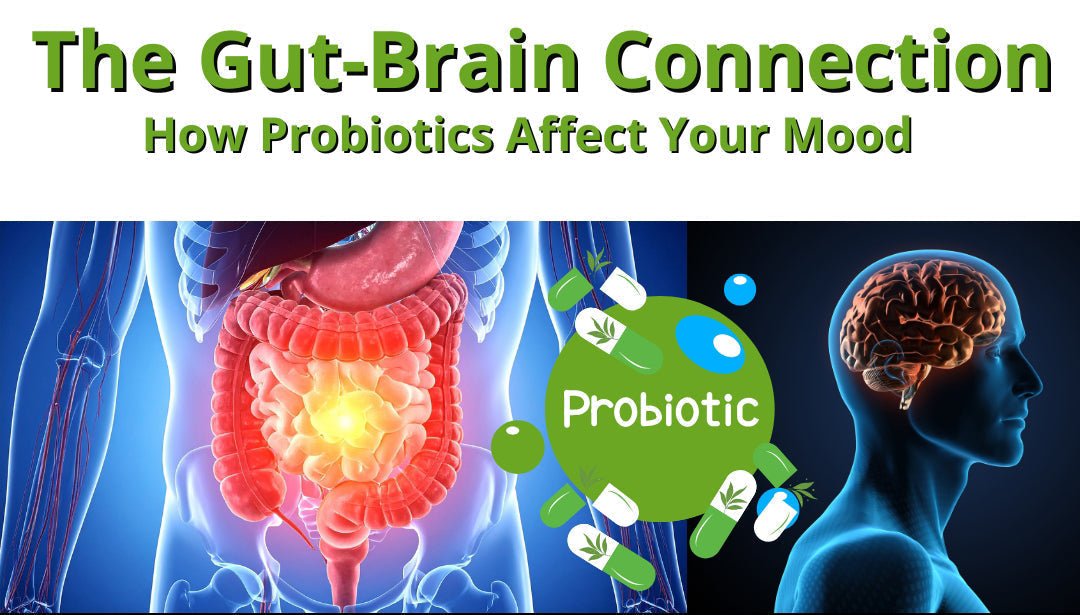The Gut-Brain Connection: How Probiotics Affect Your Mood

The symbiotic relationship between the gut and brain has become a fascinating area of study in recent years. Known as the "gut-brain axis," this complex communication network connects your emotional and cognitive centers to your digestive system. Central to this axis is the role of probiotics, live beneficial bacteria that dwell in our gut. Emerging research suggests that these tiny organisms may have a profound impact on our mood and mental health.
Understanding the Gut-Brain Axis
The gut-brain axis is a bidirectional communication system linking the central and enteric nervous systems via the vagus nerve, neurotransmitters, and gut microbiota. This interaction opens up possibilities for gut flora to influence brain function. It's become increasingly clear that the state of our gut can affect the way we feel, and vice versa.
Probiotics: What Are They?
Probiotics are live microorganisms that, when consumed in adequate amounts, confer health benefits to the host. Commonly found in fermented foods like yogurt, kefir, and sauerkraut, or available as dietary supplements, probiotics play a crucial role in maintaining gut health by replenishing and balancing the community of microorganisms found in the intestines.
How Probiotics Influence Mood
Enhancing Serotonin Production
A significant portion of the body's serotonin—an essential neurotransmitter often dubbed the "feel-good" hormone—is produced in the gut. Probiotics can enhance the production of serotonin, reduce inflammation, and foster an environment conducive to emotional well-being. By supporting a balanced gut microbiome, probiotics potentially help alleviate symptoms of depression and anxiety.
Reducing Stress and Anxiety
Several studies demonstrate that certain probiotic strains can reduce stress-related behaviors and anxiety. For instance, the strain Lactobacillus rhamnosus has been observed to alter the expression of GABA receptors in the brain, which are crucial for maintaining a relaxed state and reducing anxiety levels.
Improving Cognitive Function
Probiotics not only affect mood but also cognitive function. Research indicates that individuals taking probiotic supplements often perform better on cognitive tasks and exhibit improved memory and decreased cognitive decay, suggesting that a healthy gut flora may promote a clearer, sharper mind.
Incorporating Probiotics into Your Diet
Incorporating probiotics into your daily diet can be a straightforward and natural way to support mental health:
-
Yogurt: Contains live cultures and is easy to integrate into breakfast or snacks.
-
Kefir: A fermented milk drink dense in probiotic content.
-
Sauerkraut and Kimchi: Fermented vegetables rich in probiotics and fibers.
-
Supplements: For those who prefer not to alter their diet, supplements offer a convenient alternative.
The Future of Probiotics and Mental Health
While the research is promising, it’s important to recognize that probiotics are just one dimension of a holistic approach to mental wellness. A balanced diet, regular exercise, and stress management are also crucial components.
However, as scientific understanding deepens, probiotics may become a standard component of treatment protocols for mood disorders. Personalized medicine that includes specific probiotic strains tailored to individual microbiomes could revolutionize how mood disorders are managed.
Conclusion
The gut-brain connection is a burgeoning field full of potential. While we're just beginning to unravel the complexities involved, the role probiotics play in modulating mood and mental health is clear. By nourishing our gut, we may be better equipped to nurture our mind. As research continues to evolve, understanding how to leverage this connection may offer transformative ways to enhance overall well-being.
The exploration of probiotic interventions has unveiled promising prospects for improving mental health conditions, including depressive symptoms. By modulating the microbiota-gut-brain axis, probiotics can influence the communication pathways that link the gastrointestinal tract to the human brain. Research into the effects of probiotics reveals their potential to produce short-chain fatty acids and gamma-aminobutyric acid, which play crucial roles in mood regulation and immune function.
In addressing depressive disorders such as major depression, animal studies have shown that probiotic formulations can mitigate cognitive impairment and cognitive reactivity by altering gut microbiota. The beneficial effects of multispecies probiotics on digestive health and immune responses may extend their influence to mental health disorders, potentially reducing depression severity and enhancing quality of life.
Clinical studies and systematic reviews highlight the potential of probiotics in brain health, particularly in alleviating the impacts of chronic stress and reducing the cortisol response associated with mental disorders. Probiotic foods, through their positive effects on gut-brain communication and brain-gut connection, might offer a natural adjunct to conventional treatments for mental and neurological disorders.
Moreover, the consensus statement regarding mental health interventions suggests incorporating probiotics as part of a comprehensive approach to managing cognitive health. Healthy volunteers in controlled trials have demonstrated improved daily life functioning and a reduced risk of cognitive decline, pointing towards a symbiotic relationship between digestive health and cognitive well-being.
In summary, the integration of probiotics into strategies for managing mental disorders holds potential for improving mood regulation, supporting brain health, and enhancing overall human health. Future studies should aim to refine probiotic formulations to maximize these positive effects, ensuring that probiotics contribute meaningfully to both brain health and quality of life in individuals experiencing mental health challenges.






